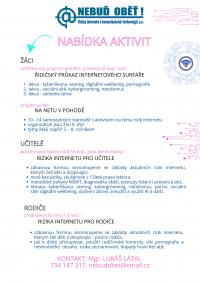

 Certifikovaný program primární
Certifikovaný program primárníprevence pro žáky MŠMT
 Akreditované školení
Akreditované školenípro učitele MŠMT
 3. místo za ČR v soutěži Evropská
3. místo za ČR v soutěži Evropskásíť prevence kriminality (EUCPN)
- Aktivity září a říjen
- Kraj pro bezpečný internet 2024
- Community volunteering against cyber bullying
- Sticks and Stones
- Šablony - Zvyšování kvality neformálního vzdělávání v Moravskoslezském kraji
- European Solidarity Corps
- ff
- Yes We Can !
- Bezpečnější internet s Ministerstvem zdravotnictví
- Tolerance vede ke štěstí
- Ostrava - město odpovědných škol 2022
- Bezpečný internet s ČSOB II.
- trikem proti kyberšikaně
- Kyberšikana má červenou 2022
- S kyberšikanou v duši II.
- Umění startu
- S kyberšikanou v duši
- S kyberšikanou pod kůží
- Řidičský průkaz internetového surfaře
Help
Everybody knows principles of decent behaviour and moreover, driving license owners also know Highway Code. Not everybody, however, follows these rules, which actually doesn’t change the general awareness about its existence. Basically, you can say that everything has its rules: a simple child play or international trade. In short, rules are needed for majority of human activities. Even though Cicero said that „no rules are fixed and permanent“, we will try to outline principles of decent behaviour on the Internet. The Internet is anonymous space and many people thus shed their restraints in discussions. Such people offend other users, they don’t mince their words about elderly people as well as they use vulgarisms a lot. A similar pattern of behaviour, which sometimes even an intelligent family man doesn’t avoid, may be seen also in traffic – intolerance, aggression, rudeness, manifestation of power, etc.
Traffic is similar to the Internet in its anonymity; primarily, one doesn’t see a person but a car. Coachwork works as something that imaginarily separates a driver from the outer world and closes him into his own selfish world. Let’s, however, speak about principles of decent behaviour on the Internet.
Principles of decent behaviour on the Internet could be summarised very simply – don’t do strangers what you wouldn’t do them in the street. We speak here about a golden rule of so-called netiquette. What does netiquette mean? This word was created by combining two words – net (a virtual one) and etiquette (code of decent behaviour). It is a set of recommendations about decent behaviour on the Internet. As devaluation of mutual communication have been observed on the Czech and global Internet, we consider knowledge of netiquette fundamental for each Internet user. Don’t you believe? Patrik Banga who is an administrator of inadequate comments on the iDNES server said on www.technet.cz that he, on average, erases 8 200 such comments a week. Majority of vulgarisms appear under the articles about death – death of celebrities and then death of children. Vulgarisms are present also under the articles considering politicians, the Gypsies, the Jews, the Muslims but also football. Let’s then have a look on rules concerning netiquette.
Netiquette focuses on the Internet users – e-mail senders, contributors to discussions, chat participants, web pages authors. Always have on mind that your article, contribution or letter is read by a factual person! Netiquette Decalogue looks like that:
- Behave in a way so you do not harm others.
- Do not restrict others in their work in the network.
- Do not look at files of other users.
- Do not use a computer to steal.
- Do not use the network to publish false information, false testimony.
- Do not use or do not copy the software which you did not pay for.
- Do not use other people's resources without authorization.
- Do not take over the intellectual riches of others.
- Do think about the joint effects of the program that you create.
- Use a computer with respect and dignity.
Let’s, however, describe other principles of netiquette:
- Avoid unnecessary aggression, personal attacks and vulgarisms. If someone has attacked you verbally, wait a moment with your answer; you may change your opinion and you will be detached too.
- Do not aim attention to yourselves, do not expect an immediate response, you never know what a respondent is doing at the moment.
- Have in mind that nobody knows you as a personality, you picture yourselves through your words; pay attention to your grammar and the contents of your utterance.
- If you write a discussion contribution or an article, try to avoid unnecessary words present in spoken utterance; be brief and specific.
- When sending great amount of data, try to compress it with the help of so-called zip; also make sure that the receiver agrees with this package.
- Entitle and identify the contents of a message, the receiver will be better informed.
- If you have received a mail that came from someone who apparently mistook the recipient, delete the contents and inform the sender immediately of this fact. Each of us is wrong, makes mistakes, so let’s be tolerant and try to help. We would not just throw away a letter.
- Avoid forwarding nonsense - funny videos, images, tests, jokes, hoaxes, chain letters, etc. Otherwise you risk that a counterparty will block you and a really important message will be ignored, overlooked.
- If you attend a conference, you can get a variety of relevant and reliable information, but we recommend choosing an appropriate degree of questions to make sure that desired information cannot be found in the "ordinary cyberspace." Have a look into FAQs, use search engines, etc.
- If you are good at some field, advise.
- Last basic advice is the Internet's motto: "Be conservative when sending and liberal when receiving."















